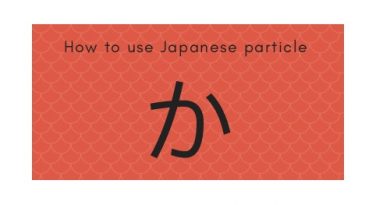Most common Japanese adverbs list
Adverbs play an important part in the sentence. It makes the sentence clearer and more nuanced. In this post, Learn Japanese Daily will introduce to you the basic knowledge of Japanese adverbs (Definition of Japanese adverbs, types of Japanese adverbs, how to use Japanese adverbs…), as well as the most common Japanese adverbs list.

Contents
What are Japanese adverbs?
Japanese adverbs are words used to modify verbs, adjectives or other adverbs. There are also cases where Japanese adverbs modify nouns.
Example :
とてもきれいです (totemo kirei desu) : It is very beautiful. In this sentence, とても (very) is an adverb that modifies the adjective きれい (beautiful)
一番早く走ったのは私でした (ichiban hayaku hashita no ha watashi deshita) : The one who ran the fastest was me. In this sentence, 一番 – ichiban (number one, first place, best, most) is an adverb that modifies another adverb 早く – hayaku (quickly, fast), and the adverb 早く – hayaku (quickly, fast) modifies the verb 走った – hashitta (ran).
もっと上を探しなさい (motto ue wo sagashinasai): Look for it even above. In this sentence, the adverb もっと (more, even more) modifies the noun 上 – ue (above, up, over, top)
Types of Japanese adverbs
Japanese adverbs indicating the state
These are Japanese adverbs that modify verbs. They show how an action described by a verb takes place according to the state.
These Japanese adverbs are divided into the following types :
Adverbs indicating time relations
準備をすぐに始める (Get ready immediately)
Adverbs indicating frequency
たまに買い物に行く : I sometimes go shopping
いつもニコニコする : Always smile
Adverbs indicating the condition
背がぐんぐん伸びる : grow taller and taller
Adverbs indicating the sound of animals in Japanese
蛙がケロケロとなく : The frog squeals “kero kero”
Japanese adverbs indicating the degree
These adverbs are used to modify questions, sentences expressing a ban or emotional expressions.
非常に美しい : Very beautiful (modify adjective)
もっとゆっくり歩け : Walk more slowly (modify verb)
Japanese adverbs indicating the description
These adverbs are used in certain sentences such as:
明日はきっと雨だ : It will definitely rain tomorrow
おそらくこないだろう: Probably won’t come
まさか彼はいくまい : No way he will go
なぜいかないのか : Why not go?
Demonstrative adverbs
They include some adverbs such as: こう (like this), そう (like that)
そうしましょう : Let’s do that.
Position of Japanese adverbs in the sentence
They can be placed at the beginning of the sentence:
この間、彼女とあった : Recently, I met her
Or they can be placed before verbs or adjectives that they modify :
ゆっくり歩く : Walk slowly
かなり重い : quite heavy.
How to create Japanese adverbs
Basically, Japanese adverbs are available. With adverbs created from adjectives, they are created as follows :
A い : い –> く . Example: 高い → 高く、 はやい → はやく
A な : remove な and add に. Example : きれいな → きれいに.
Most common Japanese adverbs list:
1. 今 [いま] : now
2. まだ : not yet
3. そう : like that
4. もう : already
5. どうぞ : please, kindly, feel free
6. よく : often
7. こう : like this
8. もっと : more, even more
9. 直ぐ [すぐ] : immediately, right away, soon
10. とても : very
11. いつも : always
12. 一番 [いちばん] : number one, first place, best, most
13. 一緒に [いっしょに] : together (with)
14. かなり : considerably, fairly, quite
15. 少し [すこし] : small quantity, little, few
16. 近く [ちかく] : nearly
17. 多分 [たぶん] : perhaps, probably
18. ちょっと : little bit
19. いっぱい : fully, much
20. 時々 [ときどき] : sometimes
21. 本当に [ほんとうに] : really, truly
22. ゆっくり : slowly, at ease
23. ほとんど : mostly, practically, almost
24. もう : further, more, again; already
25. 初めて [はじめて] : for the first time
26. まず : first (of all), anyway, now
27. あまり : not very, not much
28. 一人で [ひとりで] : alone, by oneself
29. ちょうど : exactly, precisely, just, right
30. ようこそ : Welcome!
31. 絶対に [ぜったいに] : absolutely, unconditionally, never
32. なるほど : I see, that’s right, indeed
33. つまり : that is to say, in other words, I mean, that means
34. そのまま : without change, as it is, as it was
35. はっきり : clearly
36. 直接 [ちょくせつ] : direct, immediate
37. 特に [とくに] : particularly, especially
38. あちこち : here and there, all around, everywhere
39. もし : if, in case, supposing
40. 全く [まったく] : really, truly, entirely, completely
41. もちろん : of course, certainly
42. やはり : as expected
43. よろしく: best regards, please do
44. いつか : sometime, someday, one day
45. たくさん : a lot, plenty, many
46. また : again
47. 非常に [ひじょうに] : very, extremely
48. 必ず [かならず] : without exception, necessarily, certainly,
49. 急に [きゅうに] : suddenly, abruptly, unexpectedly
50. ずっと : continuously in some state, throughout, all the way
Above is Most common Japanese adverbs list. See other similar posts at category : Japanese particles



thank you so much, this site is very useful to get ready for jlpt
Thanks you verymuch Paola,
we are trying to deverlop more and more content to help Japanese learners leanr Japanese online easier
よろしくお願いします。